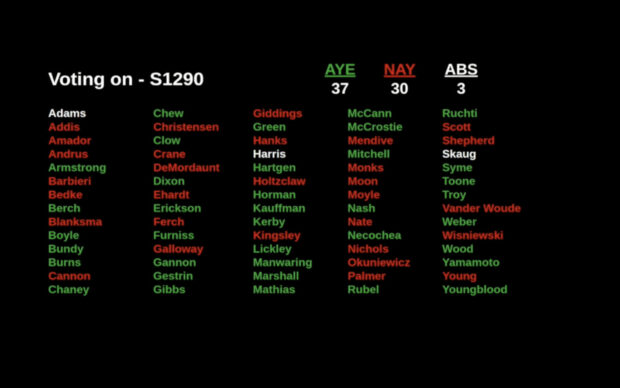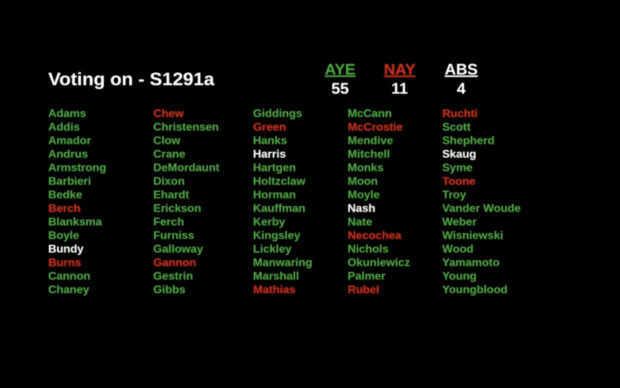Most Idaho public school teachers, administrators and school support staff could receive up to a $1,000 bonus under a budget bill, passed by the Senate Wednesday.
“I think this is an excellent appropriations bill, and we worked hard to make sure that our administrators, our classified and our certified staff would receive bonuses,” said Sen. Janie Ward-Engelking, D-Boise, a former teacher. “It’s been a grueling year for them.”
Only Sen. Lori Den Hartog, R-Meridian, debated against the bill. She said she’s conceptually in favor of bonuses for teachers but argued school districts and charters should fund them with their own federal coronavirus relief funds, or Elementary and Secondary School Emergency Relief (ESSER) dollars.
The bonuses would come out of Idaho’s money from the American Rescue Plan Act (ARPA), but not out of money specifically earmarked for elementary and secondary schools by the feds.
Senators on both sides of the issue acknowledged that extra staff positions, paid for by districts with money not allocated for salaries by the state, may not have bonuses covered due to the way the proposal is funded.
“That’s where their ESSER money can probably come in and fill that gap,” said Ward-Engelking.
The budget bill containing the bonuses, Senate Bill 1404, represents an expanded version of the proposal Gov. Brad Little made during his January State of the State address, which mentioned possible $1,000 bonuses only for teachers.
The bill must now clear the House to reach Little’s desk. It passed the Senate 28-5.
More ESSER news. The Senate also signed off on a bill that would authorize spending of ESSER money from ARPA that is controlled by the State Board of Education. The biggest ticket item under that umbrella is a $26 million chunk that the State Board plans to use for student data collection.
Rural teacher incentive program clears House
A bill aimed at retaining rural teachers by offering them grants, funding for student loan repayments, postgraduate studies and additional teaching endorsements survived a House vote after easily passing the Senate last month.
Rep. Sally Toone, R-Gooding, said more needs to be done to keep rural districts from bleeding teachers, especially to combat educational setbacks from the pandemic.
“Schools are the center of our rural communities,” said Toone, a career teacher. “And it’s our duty to promote that community livelihood.”
With no debate, the House sent Senate Bill 1290 to Gov. Brad Little’s desk on a 37-30 vote. All House Democrats and 25 Republicans supported it.

Teachers in rural or high-poverty districts could receive a max of $12,000 over four years and could put that money toward eligible expenses. But the cost of the program, and the number of teachers who could be recipients, will depend on how much — if any funding — the Joint-Finance Appropriations Committee puts into the program.
Lawmakers have made multiple attempts to create a rural teacher incentives program in recent years. SB 1290 is the first to gain legislative approval.
Charter teaching certificates. A vastly different approach to solve Idaho’s teacher shortage also passed the House.
Senate Bill 1291 would allow charter schools to hire anyone with a bachelor’s degree – who is not a certified teacher – to teach in their classrooms by awarding them a charter-specific teaching certificate.
The certificates wouldn’t allow these educators to teach at traditional schools, but other charters could honor the certificates.
“These charter schools need to be able to hire the best possible applicant,” said bill sponsor Rep. Ryan Kerby, R-New Plymouth, a former superintendent. “With our teacher shortage, if the best possible applicant is someone with one of these, then that’s the best thing for the kids in that school district, and best thing for the kids in the state of Idaho.”
Rep. Chris Mathias, D-Boise, debated against the bill, saying it tries to solve the teacher shortage by producing more teachers, when the shortage is in fact caused by schools’ inabilities to retain teachers.
“They’re coming into the system. We’re not supporting them. We’re not supporting their retention, and we’re losing them,” Mathias said.
Supporters of the bill argued charters are a good place to experiment with new policies and test their effectiveness.
SB 1291 eventually passed 55-11 on party lines, and heads to Little’s desk.

Career exploration course gets a reluctant OK
Despite some concerns about logistics — and squeezing another class into the schedule — the House Education Committee signed onto requiring a middle school career exploration course.
Senate Bill 1374 would put the eighth-grade course requirement in place, starting in 2023-24. The course would likely run a quarter, a trimester or a semester, said Sen. Dave Lent, R-Idaho Falls, the bill’s sponsor.
Lent said his goal is to better prepare students for the rest of their educational career, and what awaits them after school. A high school diploma generally only prepares a graduate for a job in fast food or at a hotel, he said, while a college degree is often just “a threshold to get a job interview.” Meanwhile, businesses need workers with skills beyond high school, but less than a bachelor’s degree.
“We can do better, and this is a first step,” Lent said.
The bill left House Education members wrestling with tradeoffs.
No one questioned the importance of helping eighth-graders prepare for their future.
But several committee members said eighth-graders also need to learn about their changing bodies, and their health.
SB 1374 would allow schools to offer the career exploration course instead of a middle school health course.
That clause led Rep. Dorothy Moon to vote against the bill. Time in the middle school schedule is limited, especially in four-day schools, and the events of the past two years have underscored the importance of health courses, said Moon, R-Stanley.
Rep. Sally Toone, D-Gooding, also voted no. Toone said she has taught high school career exploration classes and middle school health — and sees the value of both. And she noted that the middle school health content standards don’t go away, even if a middle school health class does.
“I hate to put more in our curriculums,” she said.
Lent said the schools aren’t required to drop middle school health — but they could fold the curriculum into ninth-grade health. And Rep. Kerby, a retired school superintendent, said there are ways to juggle career exploration and health.
“If you talk to the kids, a semester of health is a long time,” said Kerby, R-New Plymouth.
After passing the Senate unanimously last week, SB 1374 passed House Education over objections from Moon, Toone and Rep. John McCrostie, D-Garden City. It now heads to the House floor.
JFAC votes to max out rainy-day fund
Budget writers voted to max out the state’s rainy-day fund for public schools in a pair of votes to transfer $121 million into the Public Education Stabilization Fund (PESF) over this fiscal year and next.
The Joint-Finance Appropriations Committee swiftly backed the transfers Wednesday, which would add $44 million to the fund this fiscal year and $77 million in the 2023 fiscal year.
Sen. Jim Woodward, R-Sagle, lauded the transfer as “farm-family economics” as the state sits on a record budget surplus.
“When you have money you can put away, you do, and then when things aren’t quite as sunny, then you make use of those funds over time wisely,” Woodward said.
Rep. Ron Nate, R-Rexburg, was the only committee member to vote against the move, saying he opposes rainy-day funds in general, which “serve to preserve government and to keep it growing rather than having government be trimmed when it’s needed.”
PESF is intended to hold emergency funds to serve as a stopgap when the state’s annual school budget falls short of covering operational costs. Lawmakers last year froze the fund through June 2023, decrying perennial transfers — chiefly to cover under-budgeted transportation costs.
School districts have decried the freeze, saying the uncertainty of being locked out of rainy-day funds is causing them to hold onto federal coronavirus relief funds in case of emergencies.
Little recommended the transfers into PESF at the start of the legislative session. He also called on the Legislature to unfreeze the fund, but no such move has been made.
Charter commission budget passes
Also Wednesday morning, the Senate passed the budget for the Idaho Public Charter School Commission. The $680,000 amount represents a 43.4% decrease over this year.
The budget bill passed unanimously and heads to Gov. Brad Little’s desk.
Editor’s note: This story has been corrected to reflect that the Idaho Public Charter School Commission’s budget will decrease by 43.4%, not increase.
